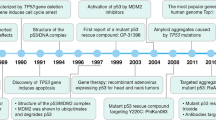Abstract
The objective of this study was to determine the role and mechanism of S-phase kinase-associated protein 2 (Skp2) in colorectal cancer cell proliferation and survival both in vitro and in vivo. Adenoviral vector expressing Skp2 short hairpin RNA was transduced into SW480 cells. The effects of Skp2 on cell cycle and survival were assessed by Flow Cytometry. Cell proliferation was analyzed by MTT assay. The expression of cell cycle regulators p16 and p27 were measured by western blot. In vivo, human colorectal cancer was produced by xenograft of cancer cells in nude mouse. Tumor growth inhibitory rate was calculated to generate growth curve. Tumor growth was monitored by examining proliferating cell nuclear antigen expression, whereas tumor cell apoptosis was detected by TdT-mediated dUTP nick-end labeling (TUNEL) staining. Knockdown of Skp2 blocked SW480 tumor cell growth and induced cell apoptosis. Skp2 appeared to be very important for the progression of cell cycle at G1/S phase. In vivo, blockade of Skp2 expression inhibited tumor growth and induced tumor apoptosis. Mechanistically, Skp2 regulated the expression of both p27 and p16 both in vitro and in vivo. The conclusion that we derive from this study is that Skp2 regulates colorectal cancer cell growth by inhibiting the expression of cell cycle regulator p27 and p16.
This is a preview of subscription content, access via your institution
Access options
Subscribe to this journal
Receive 12 print issues and online access
$259.00 per year
only $21.58 per issue
Buy this article
- Purchase on Springer Link
- Instant access to full article PDF
Prices may be subject to local taxes which are calculated during checkout







Similar content being viewed by others
References
Summers T, Langan RC, Nissan A, Brücher BL, Bilchik AJ, Protic M et al. Serum-based DNA methylation biomarkers in colorectal cancer: potential for screening and early detection. J Cancer 2013; 4: 210–216.
Kitagawa M, Kitagawa K, Kotake Y, Niida H, Ohhata T . Cell cycle regulation by long non-coding RNAs. Cell Mol Life Sci 2013; 70: 4785–4794.
Sayeed A, Luciani-Torres G, Meng Z, Bennington JL, Moore DH, Dairkee SH . Aberrant regulation of the BST2 (Tetherin) promoter enhances cell proliferation and apoptosis evasion in high grade breast cancer cells. PLoS One 2013; 8: e67191.
Qin R, Chen Z, Ding Y, Hao J, Hu J, Guo F . Long non-coding RNA MEG3 inhibits the proliferation of cervical carcinoma cells through the induction of cell cycle arrest and apoptosis. Neoplasma 2013; 60: 486–492.
Liu J, Tan L, Li H, Wang Q, Ji W . Suppression of S-phase kinase-associated protein 2 induces apoptosis and inhibits tumor growth in human laryngeal cancer. ORL J Otorhinolaryngol Relat Spec 2010; 72: 205–214.
Yoshida Y, Ninomiya K, Hamada H, Noda M . Involvement of the SKP2-p27(KIP1) pathway in suppression of cancer cell proliferation by RECK. Oncogene 2012; 31: 4128–4138.
Wei Z, Jiang X, Liu F, Qiao H, Zhou B, Zhai B et al. Downregulation of Skp2 inhibits the growth and metastasis of gastric cancer cells in vitro and in vivo. Tumour Biol 2013; 34: 181–192.
Wang XC, Wu YP, Ye B, Lin DC, Feng YB, Zhang ZQ et al. Suppression of anoikis by Skp2 amplification and overexpression promotes metastasis of esophageal squamous cell carcinoma. Mol Cancer Res 2009; 7: 12–22.
Fang L, Hu Q, Hua Z, Li S, Dong W . Growth inhibition of a tongue squamous cell carcinoma cell line (Tca8113) in vitro and in vivo via siRNA-mediated down-regulation of skp2. Int J Oral Maxillofac Surg 2008; 37: 847–852.
Chartier C, Degryse E, Gantzer M, Dieterle A, Pavirani A, Mehtali M . Efficient generation of recombinant adenovirus vectors by homologous recombination in Escherichia coli. J Virol 1996; 70: 4805–4810.
Tang J, Wang J, Guo L, Kong X, Yang J, Zheng F et al. Mesenchymal stem cells modified with stromal cell-derived factor 1a improve cardiac remodeling via paracrine activation of hepatocyte growth factor in a rat model of myocardial infarction. Mol Cells 2010; 29: 9–19.
Hu Y, Lehrach H, Janitz M . Apoptosis screening of human chromosome 21 proteins reveals novel cell death regulators. Mol Biol Rep 2010; 37: 3381–3387.
Sistrunk C, Kim SH, Wang X, Lee SH, Kim Y, Macias E et al. Skp2 deficiency inhibits chemical skin tumorigenesis independent of p27(Kip1) accumulation. Am J Pathol 2013; 182: 1854–1864.
Wu L, Grigoryan AV, Li Y, Hao B, Pagano M, Cardozo TJ . Specific small molecule inhibitors of Skp2-mediated p27 degradation. Chem Biol 2012; 19: 1515–1524.
Hu X, Liu F, Jiang B, Wang Y . The expression of Skp2 in human non-small cell lung cancer and its correlation with expression of p27 protein [Article in Chinese]. Zhongguo Fei Ai Za Zhi 2008; 11: 547–550.
Acknowledgements
This study was supported by grants from Hubei Education Department Science Foundation (200524001), Hubei Science and Technology Department Natural Science Foundation (2011CDB01802).
Author information
Authors and Affiliations
Corresponding author
Ethics declarations
Competing interests
The authors declare no conflict of interest.
Rights and permissions
About this article
Cite this article
Xu, SY., Wang, F., Wei, G. et al. S-phase kinase-associated protein 2 knockdown blocks colorectal cancer growth via regulation of both p27 and p16 expression. Cancer Gene Ther 20, 690–694 (2013). https://doi.org/10.1038/cgt.2013.70
Received:
Accepted:
Published:
Issue Date:
DOI: https://doi.org/10.1038/cgt.2013.70



